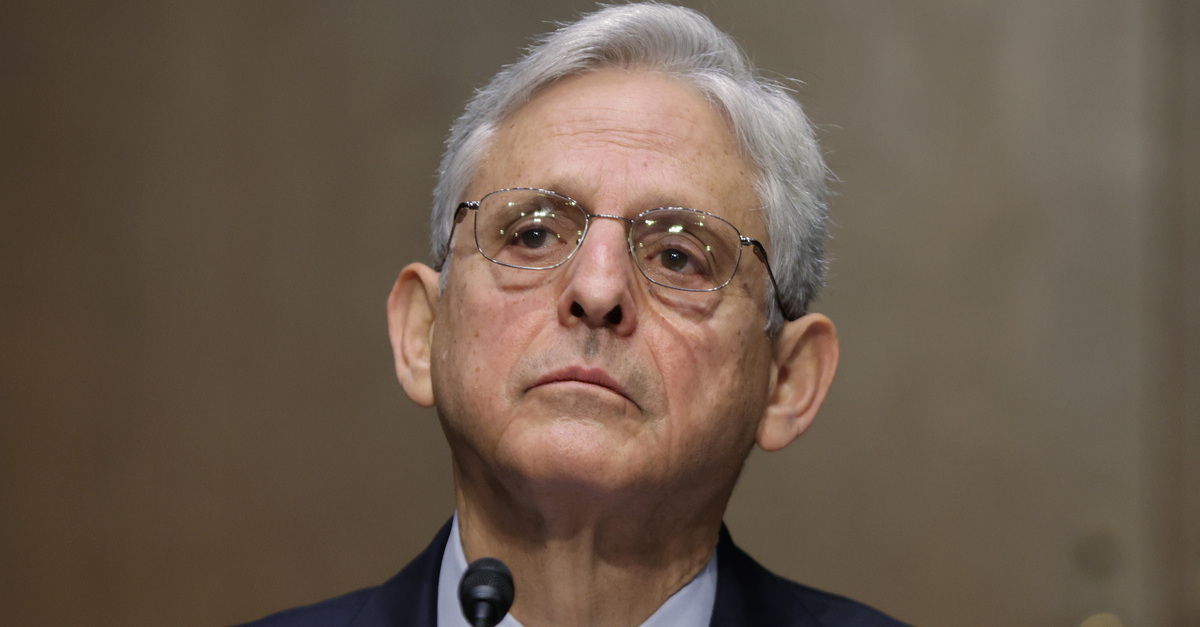
U.S. Attorney General Merrick Garland
U.S. Attorney General Merrick Garland filed a federal lawsuit against the State of Missouri on Wednesday, challenging the state’s aggressive gun law known as “The Second Amendment Preservation Act.” This federal lawsuit comes as a challenge to the same law is proceeding in Missouri state court.
The lawsuit, which names Missouri Governor Mike Parson (R) as a defendant, seeks to win a turf battle between federal and state authority on the topic of guns. While H.B. 85 sought to create a work-around for federal firearms laws, Garland’s lawsuit now aims to eradicate that law on the grounds that Missouri exceeded its authority and impaired federal law enforcement.
H.B. 85, enacted June 2021, contains a paragraph as follows:
Declares that all federal acts, laws, executive orders, administrative orders, court orders, rules, and regulations, whether past, present, or future, that infringe on the people’s right to keep and bear arms as guaranteed by the Second Amendment to the United States Constitution and Article I, Section 23 of the Missouri Constitution must be invalid in this state, including those that impose a tax, levy, fee, or stamp on these items as specified in the bill; require the registration or tracking of these items or their owners; prohibit the possession, ownership, use, or transfer of a firearm; or order the confiscation of these items.
The law contains a provision allowing citizens to sue local police agencies for $50,000 for each incident in which the individual proves their rights to bear firearms was violated, and discourages local law enforcement from enforcing federal firearms regulations.
In a statement, the Biden administration explained its rationale for filing the lawsuit challenging H.B. 85, citing the law’s conflict with “fundamental constitutional principles of supremacy of federal law, preemption, and intergovernmental immunity,” and its effect of “penaliz[ing] current federal employees by barring them from state employment if they enforced the purportedly invalid laws.”
The 28-page complaint, filed in U.S. District Court for the Western District of Missouri, asserts that the law “uniquely discriminates against federal agencies and employees; impairs law enforcement efforts in Missouri; and contravenes the Supremacy Clause of the United States Constitution.” It emphasizes not only Missouri’s lack of authority to enact a law that conflicts directly with federal statute, but focuses also on the practical impact of H.B. 85, pointing to the statute’s interference with joint state and federal task forces. “Although a state may lawfully decline to assist with federal enforcement,” allows the complaint, “a state may not directly regulate federal authority.”
Garland’s complaint argues that Missouri’s statute is a direct violation of the Supremacy Clause of the U.S. Constitution, asserting that state law is invalid to the extent it conflicts with federal law. It also raises the argument that Missouri has violated “intergovernmental immunity,” in that Missouri’s statute singles out the federal government for unfavorable treatment.
Specifically, the lawsuit references the National Firearms Act (“NFA”) and the Gun Control Act (“GCA”) — two federal laws that regulate the licensure, transfer, and transportation of firearms — as creating a direct conflict with H.B. 85.
Asking for a court order blocking the Missouri law, the Biden administration argues:
Since its enactment, H.B. 85 has endangered public safety—and the United States’ efforts to promote public safety—by imperiling the successful partnerships between federal, state, and local law enforcement agencies that are critical to fighting violent crime within Missouri.
The complaint leans on statistics as well, pointing out that H.B. 85 “significantly reduces the utility” of important resources such as the National Integrated Ballistic Information Network (“NIBIN”).
“In the last three years, NIBIN has helped law enforcement officers in Missouri generate over 6,000 leads, including 3,149 leads in jurisdictions outside of where the lead was sourced,” the complaint provides as context. It continues, “Further, from October 2019 to June 2021, NIBIN successfully identified approximately 200 suspects linked to firearm crimes in the State.”
DOJ also references harms to individual law enforcement officers caused by the law.
“Prior to H.B. 85, it was relatively common for federal employees involved in the enforcement of federal firearm laws to seek and obtain employment with political subdivisions and/or law enforcement agencies within Missouri,” the complaint states. Now, though, those individuals are rendered unemployable “solely as a result of their prior lawful federal service.”
Missouri Attorney General Eric Schmitt (R) said in a tweet that the case is “a partisan lawsuit which seeks to attack Missourians’ #SecondAmendment rights & bring an end to the state’s crime-fighting tactics, including the Safer Streets Initiative.”
Schmitt continued, declaring “the law is on our side” and promising, “we’ll beat Biden’s DOJ in court once again.”
This is a partisan lawsuit which seeks to attack Missourians’ #SecondAmendment rights & bring an end to the state’s crime-fighting tactics, including the Safer Streets Initiative.
The law is on our side & we’ll beat Biden’s DOJ in court once again. #2A https://t.co/p4JwutGqUy
— Eric Schmitt (@Eric_Schmitt) February 17, 2022
[image via Tasos Katopodis-Pool/Getty Images]
Have a tip we should know? [email protected]